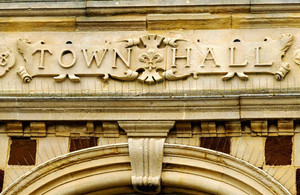Hundreds of town halls opt to freeze Council Tax this year
New figures show that 231 councils plan to take up the offer of additional government funding to help freeze Council Tax.

Town hall.
New figures published today (2 March 2014) show that 231 councils intend to take up the offer of additional central government funding to help freeze Council Tax this year.
The government is providing up to £550 million in extra Whitehall grants to local authorities that freeze their bills from this April.
Since 2010, the government has worked with local authorities to reduce the cost of living by freezing Council Tax, cutting average bills in England by 10% in real terms.
In a boost to direct democracy, any local authority that chooses to raise Council Tax by 2% or above must put it to a public vote. This threshold is lower than last year - striking an appropriate balance between direct democracy and representative democracy ensuring local people have a democratic check over tax hikes through a binding local referendum. Local referendums could be held on the same day as the European elections on 22 May at minimal extra cost or inconvenience.
In pursuit of further local accountability, from this year, every vote cast by councillors on Council Tax and budgets should be made a matter of public record and allow residents to see where elected representatives have voted with their best interests at heart.
Further information
-
Percentage change in Council Tax in real terms since May 2010 by English local authority, based on the Retail Price Index, is available for download.
-
In 1997 to 1998 average Band D Council Tax in England was £688, by 2010 to 2011 it had increased to £1,439 an increase of 109%. This table shows the change in Band D Council Tax over a 20 year period between 1993 to 1994 and 2013 to 2014 at national and local authority level.
-
The government has provided total freeze funding of up to £5.2 billion up to 2015 to 2016, which is an unprecedented 5 years of Council Tax freezes worth potentially up to £1,100 for an average Band D taxpayer over the lifetime of this Parliament. The table provides the potential financial savings in Council Tax (compared to an annual 5% increase) by English local authority.
-
Local authorities that freeze or reduce their relevant amount of Council Tax will receive a grant equivalent to a 1% increase on 2013 to 2014 band D Council Tax levels. The government has made available more than £550 million of grant in both financial years 2014 to 2015 and 2015 to 2016. This table sets out how much each council is eligible for.
-
Council Tax levels remain a local decision. The government previously had the power to restrict Council Tax rises through a centrally dictated cap. This government has scrapped that through the Localism Act, which also created a new power for local residents to veto excessive Council Tax rises instead through a local referendum. A report on Council Tax referendums proposes a referendum principle of 2.0%, with a slightly modified principle for the City of London element of the Greater London Authority precept. This threshold is lower than last year striking an appropriate balance between direct democracy and representative democracy. The government expects that most councils will wish to freeze Council Tax, but any which set an increase of 2.0% or more will need to arrange for a binding referendum to be held. Following Royal Assent of the Local Audit and Accountability Act 2014, the referendum principles will include levies and will therefore be based on the level of Band D Council Tax. This will mean the principle will relate to the actual increase which appears on people’s bills - again reducing costs for taxpayers and preventing hikes being imposed by local quangos with no democratic mandate.
-
From April 2014, funding for 2011 to 2012 and 2013 to 2014 freezes is now in the main local government settlement total for future years. Funding for the next 2 freeze years will also be built into the spending review baseline. This will give maximum possible certainty for councils that the extra funding for freezing Council Tax will remain available, and there will not be a ‘cliff edge’ effect from the freeze grant disappearing in due course.
-
Residents are also now able to pay their Council Tax bills over 12 months rather than 10 to spread the cost of bills and help with the cost of living while the government has also announced plans to remove an unfair Council Tax surcharge on family annexes and home improvements, worth £5.3 million of additional support to extended families.
Office address and general enquiries
2 Marsham StreetLondon
SW1P 4DF
Contact form https://www.gov.uk/gui...
General enquiries: please use this number if you are a member of the public 030 3444 0000
If your enquiry is related to COVID-19 please check our guidance page first before you contact us - https://www.gov.uk/guidance/coronavirus-covid-19-guidance-for-local-government.
If you still need to contact us please use the contact form above to get in touch, because of coronavirus (COVID-19). If you send it by post it will not receive a reply within normal timescale.
Media enquiries
Email newsdesk@communities.gov.uk
Please use this number if you are a journalist wishing to speak to Press Office 0303 444 1209